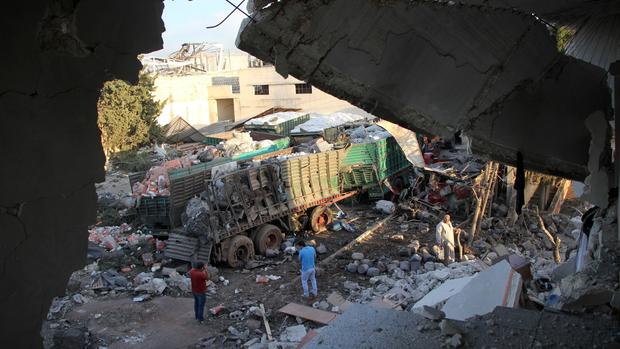Russia denies strike on aid convoy, offers bizarre explanation
ALEPPO, Syria -- The cease-fire in Syria had held, barely, for a week. Then suddenly on Monday night, the Syrian army unilaterally declared it over.
CBS News correspondent Elizabeth Palmer says Syrian army shells began to rain down on the opposition-held side of Aleppo almost immediately.
Shortly afterwards, missiles hit an aid convoy -- more than 20
trucks full of food, medicine and other essential supplies -- and the Syrian Arab Red Crescent (SARC) warehouse where they
were unloading the humanitarian relief.
Earlier in the day, the SARC sent out a
tweet saying they were sending 31 trucks full of aid into opposition territory in
the Aleppo countryside.
The international Red Cross said Tuesday that some 20 civilians were killed in the strike. Many of them are believed to have been convoy drivers and humanitarian workers. The SARC’s director in the area, Omar Barakat, was among those killed, the organization confirmed Tuesday.
“From what we know of yesterday’s attack, there has been a flagrant violation of International Humanitarian Law (IHL), which is totally unacceptable,” International Committee of the Red Cross President Peter Maurer said Tuesday in a statement. “Failing to respect and protect humanitarian workers and structures might have serious repercussions on ongoing humanitarian operations in the country, hence depriving millions of people from aid essential to their survival.”
Syrian opposition groups and activists have said the strike was likely carried out by either Syrian or Russian aircraft.
President Bashar Assad’s government and its key backers in Moscow, however, finally offered comment on the incident Tuesday, flatly denying any responsibility.
Russia’s Defense Ministry said no Russian or Syrian aircraft had carried out the strikes, and claimed only rebel factions knew the precise whereabouts of the aid convoy. According to the Interfax news agency, the Defense Ministry later said it had seen no evidence of a strike of any kind on the convoy, suggesting the approximately 20 trucks and the warehouse simply caught on fire.
Hussein Badawi, the local head of the Syrian Civil Defense Force, first responders known commonly as the “White Helmets,” told the Associated Press on Tuesday that his crew observed at least 20 missiles, some from aircraft and some appearing to be ground-launched, slam into the convoy over a two-hour period.
The Interfax report, which cited a Defense Ministry spokesman named Igor Konashenkov, suggested the White Helmets were in some way linked to al Qaeda’s affiliate in Syria, and said only they could explain what happened to the convoy.
The Obama administration appeared not to be buying the Russian denials, and even if Syria’s military carried out the strikes, the U.S. said Russia was largely culpable.
“We have strong indications -- not just from our own information, but from the United Nations, from the Syrian Arab Red Crescent, from the White Helmets -- the first responders who so bravely serve the Syrian people -- that this was an airstrike that led to these deaths,” a senior administration official told CBS News on Tuesday. “We know it wasn’t an airstrike by the coalition that we work with. That only leaves two possibilities for people -- for nations that are operating in the air in Syria, and in any case Russia is responsible for its side of this equation and will need to speak to whatever information it has about how this came about.”
Inside opposition-held Aleppo, Plamer said there has been even more civilian carnage. Activists reported at least 45 people killed, including several women and a child.
And those numbers were bound to rise, as the
shelling continued Tuesday morning.
The United Nations was furious about the strike on
the aid convoy. Its head of humanitarian aid said if the Red Crescent
convoy was deliberately targeted, the strike may amount to a war crime.
The U.N. said Tuesday morning that it was suspending all humanitarian aid convoys in Syria in the wake of the airstrike.
In the area of Uram al-Kubra alone, where the aid convoy was struck, there are an estimated 78,000 people in need of urgent aid. There are hundreds of thousands more in desperate need in rebel-held parts of Aleppo, and in other besieged areas across the country.
Still, the U.S. State Department says it’s open to trying -- with Russian cooperation -- to resurrect the cease-fire. In New York, where he was meeting Russian counterpart Sergey Lavrov Tuesday on the sidelines of the U.N. General Assembly, Secretary of State John Kerry insisted the cease-fire “is not dead.”
He said, however, that the strike on the convoy was an “egregious violation” of the cease-fire, and added that the U.S. would “reassess the future prospects for cooperation with Russia.”
Speaking earlier in Moscow, however, Kremlin spokesman Peskov said hopes of reviving the deal were, for now, “very weak.”
“The conditions are very simple,” he said according to AFP. “The shooting needs to stop and the terrorists need to stop attacking Syrian troops.”
Syria and Russia have blamed the opposition forces for the cease-fire’s failure, but both sides were guilty of violations last week, and the U.S. and its European allies say the majority of the blame lies with President Assad’s forces.
Peskov also took the opportunity to again highlight the U.S.-led coalition’s major transgression of last week, which American military officers have conceded was likely a mistaken airstrike on Syrian forces that killed dozens.
“Of course, it wouldn’t hurt if our American colleagues didn’t accidentally bomb the Syrians,” he said.
